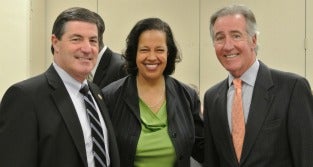On February 16, 2012, the Aspen  Institute Initiative on Financial Security (Aspen IFS) hosted the Fiscal Reform and the Future of Lifelong Savings Congressional briefing, which coincided with the release of it’s paper, The Freedom Savings Credit: A Practical Step to Build Americans’ Household Balance Sheets. Congressmen Richard E. Neal (D-MA) and Jim Gerlach (R-PA) opened the discussion, touching on the bipartisan Concurrent Resolution they spearheaded, which underscores the importance of retirement savings incentives. Congressman Neal additionally discussed the missed opportunities that currently exist to help the half of American employees who are currently missed by workplace savings plans, and he detailed his Automatic IRA legislation introduced that morning to address this coverage shortfall.
Institute Initiative on Financial Security (Aspen IFS) hosted the Fiscal Reform and the Future of Lifelong Savings Congressional briefing, which coincided with the release of it’s paper, The Freedom Savings Credit: A Practical Step to Build Americans’ Household Balance Sheets. Congressmen Richard E. Neal (D-MA) and Jim Gerlach (R-PA) opened the discussion, touching on the bipartisan Concurrent Resolution they spearheaded, which underscores the importance of retirement savings incentives. Congressman Neal additionally discussed the missed opportunities that currently exist to help the half of American employees who are currently missed by workplace savings plans, and he detailed his Automatic IRA legislation introduced that morning to address this coverage shortfall.
The event then focused on featured discussants, who analyzed various opportunities to reform our nation’s savings system in the midst of tough economic times. Robert Reynolds, President & CEO of Putnam Investments, initiated the dialogue by discussing the importance of both strong public and private savings systems, the benefits of the Automatic IRA, and the positive effects that savings incentives have on employers to help their employees save for retirement. Bob Friedman, Founder and Chair of CFED spoke next, citing experiments that prove that low-income Americans can and do save for college, homeownership, business start-ups, and retirement, when they are incentivized with matches. Brian Graff, Executive Director and CEO of ASPPA went on to discuss the imperative role employers play in the nation’s savings system, and the danger of jeopardizing employers’ investment in their employees’ retirement savings if current federal tax incentives are reduced. Bill Gale, Senior Economist of the Brookings Institution, opened his remarks with the reality that, in the current austere fiscal environment, the federal government must “cut into muscle” and cut not only waste, fraud, and abuse, but also existing good policies. Gale moved on to discuss the merits of flat refundable savings credits, which would replace the existing savings incentives in the tax code to reach those with lower- and middle-incomes — many of whom the tax code currently misses. Lisa Mensah, Executive Director of Aspen IFS, spoke last and reiterated the power of matched savings, which is reflected in Aspen IFS’ Freedom Savings Credit proposal.

